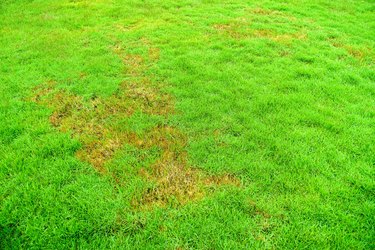
Oddly enough, dead grass over your septic tank is a good sign! It means your septic system is probably working the way it's supposed to. The grass turns brown during dry or warm weather because it isn't getting enough water, usually due to the shallow layer of soil over the tank. However, the worst thing you can do is to water the brown grass.
Tip
Dead grass over the septic tank during dry or hot weather indicates that the septic drain field is absorbing the wastewater and filtering it into the soil. The grass will recover when the weather cools and the rainy season arrives.
Video of the Day
Don't Water the Dead Grass
Brown grass over your septic tank is an aesthetic problem, but your lawn should recover in the fall. Providing the brown grass with additional water reduces your leach field's ability to absorb wastewater from your house and may even lead to the failure of your system. Even though the grass turns brown because there's not enough soil to support its root system, you shouldn't add topsoil over your tank or the leach field, either.
Video of the Day
While adding additional soil or compost over the leach field may seem like a solution, increasing the depth of the soil and giving the grass roots room to grow, it is not recommended. Adding more soil reduces the amount of air available to the microorganisms that break down the wastes in your system, which can lead to system failure.
Septic Tank Functions
Waste water from the home is piped into an underground septic tank. The solids, also known as sludge, settle in the septic tank, where beneficial bacteria break them down. Grease and oils rise to the top of the tank. The waste water in the middle drains from the tank through a series of drain lines positioned throughout the leach field.
Part of the wastewater evaporates from the leach field, particularly on warm, sunny days. The remaining wastewater filters through the soil, where microbes continue to clean it before it reaches the ground water. These microbes need oxygen. Compacted soil or wet, soggy soil has less oxygen in it and reduces the ability of the microbes to do their work effectively.
Lush Green Grass
If you have lush, green grass growing over your septic tank or the leach lines, it could mean that the septic system isn't working properly. The trenches in your leach field are filling with liquid waste because the soil can't absorb any more water from your house. That wastewater is full of rich nutrients that give the grass over your septic system a good dose of fertilizer and turn it a rich shade of green.
A clogged or damaged pipe from the house to the septic tank, or a clogged baffle on the tank may result in wastewater leaking into the soil. While unclogging the baffle is a relatively easy fix, a damaged or crushed pipe may need replacement. Other signs of trouble include slow-draining toilets, sewage odors, and sewage backing up into the house or surfacing on the leach field. Most septic tanks need to be pumped out every one to three years for optimal performance.
Precautions and Septic Tanks
When planting over your septic system, remember not to dig too deep. Drain lines may be as close as 6 inches from the top of the soil. Wear gloves, safety goggles and a mask when working with soil over the septic system to reduce exposure to harmful organisms that may be present. In addition, make sure that the tank lid and any other covers or hatches are secured; entering a septic tank can be a fatal mistake due to the gases generated by the decomposing sludge.
Select plants that don't need much maintenance, watering or fertilizer. Ornamental grasses and herbaceous plants such as catmint (Nepeta spp., USDA zones 3-8), black-eyed Susans (Rudbeckia spp., zones 3-9) and verbena (Verbena spp., zones 3-11) are good choices. Don't plant fruits, vegetables or herbs over a septic system; you risk bacterial contamination of your food.